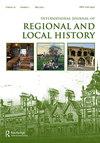Dr Thomas Plume, 1630–1704: his life and legacies in Essex, Kent and Cambridge
Q2 Arts and Humanities
International Journal of Regional and Local History
Pub Date : 2022-01-02
DOI:10.1080/20514530.2022.2058209
引用次数: 0
Abstract
of the separation between city and county or countryside. While almost all the IPMs look to the lands and resources (like water mills) of the countryside, there are three inquisitions talking of London property (114, 144, 147)) and one each for Bristol (162) and Norwich (137). But for the most part, property in a borough or town was held by different terms, if not necessarily by different men and women. In an overview of this volume – and covering a lot of people of property who died in a short span of years – it is the amount of precise information that could be offered the escheator that stands out. We talk today of a loss of privacy and of the possible intrusiveness of computer hacking. Perhaps an heir coming into property in the reign of Richard III, some of which may have had a shady genealogy, could have made the same charge, though the IPMs as we have them tell a very straightforward tale, perhaps one that had been cleaned up at some time in the past. As we have them, there is only that occasional nod to missing information or the uncertainty of an heir’s age, even if the inquisition might gloss over references to contested lands, disputed birth order and legitimacy, putative values of rents and terms of possession, and perhaps tales of fraud and even of outright theft. But the inquisitions served their purpose, as best we can judge, and we pay tribute to the level of record keeping established in medieval England, as we also do to the impressive labours of the volume’s editor. Gordon McKelvie has presented a worthy contribution to the world of scholarship and he has well-earned our gratitude.托马斯·普卢姆博士,1630-1704:他在埃塞克斯、肯特和剑桥的生平和遗产
指城市和县城或乡村之间的分隔。虽然几乎所有的IPM都关注农村的土地和资源(如水车),但有三个调查涉及伦敦房地产(114144147),布里斯托尔(162)和诺维奇(137)各一个。但在大多数情况下,一个行政区或城镇的财产由不同的条款持有,如果不一定由不同的男性和女性持有的话。在这本书的概述中——涵盖了许多在短时间内死亡的财产人——最突出的是可以为遗产管理人提供的准确信息量。我们今天谈论的是隐私的丧失以及计算机黑客攻击可能带来的侵扰。也许在理查三世统治时期继承财产的继承人,其中一些人可能有不光彩的家谱,也可以提出同样的指控,尽管我们所拥有的IPM讲述了一个非常简单的故事,也许在过去的某个时候已经被清理过了。正如我们所拥有的那样,只有偶尔对缺失的信息或继承人年龄的不确定性表示赞同,即使调查可能会掩盖有争议的土地、有争议的出生顺序和合法性、假定的租金价值和占有条款,以及可能的欺诈甚至彻底盗窃的故事。但正如我们所能判断的那样,宗教裁判所达到了目的,我们向中世纪英格兰建立的记录保存水平致敬,我们也向该卷编辑令人印象深刻的工作致敬。Gordon McKelvie为学术界做出了有价值的贡献,他赢得了我们的感激。
本文章由计算机程序翻译,如有差异,请以英文原文为准。
求助全文
约1分钟内获得全文
求助全文
来源期刊

International Journal of Regional and Local History
Arts and Humanities-History
CiteScore
0.30
自引率
0.00%
发文量
10
期刊介绍:
The International Journal of Regional and Local History aims to publish high-quality academic articles which address the history of regions and localities in the medieval, early-modern and modern eras. Regional and local are defined in broad terms, encouraging their examination in both urban and rural contexts, and as administrative, cultural and geographical entities. Regional histories may transcend both local and national boundaries, and offer a means of interrogating the temporality of such structures. Such histories might broaden understandings arrived at through a national focus or help develop agendas for future exploration. The subject matter of regional and local histories invites a number of methodological approaches including oral history, comparative history, cultural history and history from below. We welcome contributions situated in these methodological frameworks but are also keen to elicit inter-disciplinary work which seeks to understand the history of regions or localities through the methodologies of geography, sociology or cultural studies. The journal also publishes book reviews and review articles on themes relating to regional or local history.
 求助内容:
求助内容: 应助结果提醒方式:
应助结果提醒方式:


